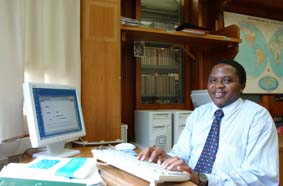Personal tools
News from ICTP 102 - Profile

W.E. Muhogora is pursuing a career that few others in his home country of Tanzania have.
Physics and Health

The career that ICTP Associate
Wilbroad Edward Muhogora has pursued in radiation physics--and,
more specifically, in health radiation physics--has not only been
filled with continual challenges and rewards; it has proven particularly
important to his home country of Tanzania. That's because Muhogora
estimates that just five people in all of Tanzania, which has
a population that exceeds 30 million, have received advanced training
in this field.
Muhogora, who serves on the scientific staff of Tanzania's National
Radiation Commission, spends about half of his work time on diagnostics
and radiotherapy--providing Tanzania's radiologists and radiation
oncologists with the radiation-protection training that they need
to optimise the images created by X-rays or the information revealed
by radiation isotopes without posing unnecessary risks to a patient's
health.
"I spend about another quarter of my time," Muhogora
says, "doing radiotherapy, which, as many people know, is
a major source of treatment for cancer and other diseases."
In addition, Muhogora is also responsible for calibrating Tanzania's
four radiotherapy machines that must work with utmost precision
if the machines are to provide reliable and effective treatment.
It has been an interesting and rewarding journey of continual
discovery for Muhogora--from his earliest school days in Kibondo,
a town of 200,000 in western Tanzania, during the 1980s, to the
research and training opportunities that he has taken advantage
of at ICTP since being appointed an ICTP Associate in 1998.
Along the way, Muhogora received an undergraduate and a master's
degree from the University of Dar-es-Salaam, Tanzania's capital
city. Moreover, during the past decade, his journey has received
a considerable boost from his participation in a variety of International
Atomic Energy Agency (IAEA) workshops, ranging from radiation
safety and protection to radioactive waste management, that have
been held both in Africa and Europe.
This September, Muhogora attended ICTP's College on Medical Physics,
helping him build additional dimensions to his research skills
that will enable him to better serve his clientele in Tanzania
on his return home.
"In addition to my other responsibilities, I head the National
Dosimetry Laboratory, which is a member of the World Health Organization/International
Atomic Energy Agency (WHO/IAEA) network of secondary standard
dosimetry laboratories. This experience, together with my association
with ICTP, has strengthened my international connections and led
to the publication of several articles in international refereed
journals, including the Journal of Radiological Protection,
Journal of Radiation Protection Dosimetry and Journal
of Applied Clinical Medical Physics."
And that's where Muhogora hopes to continue his journey. "My
plans are to eventually earn a doctorate in radiation health physics,
perhaps through the recently expanded IAEA/ICTP 'sandwich' programme."
Given the virtual absence of such professionals in Tanzania, this
degree--and the training and expertise that it brings--could prove
extremely valuable for both him and his country.
Radiation physics. As Muhogora's journey shows, it's a career
path that may be difficult to pursue, but far more risky for society
to disregard if it wants to provide its citizens with the quality
health care that they need and deserve.